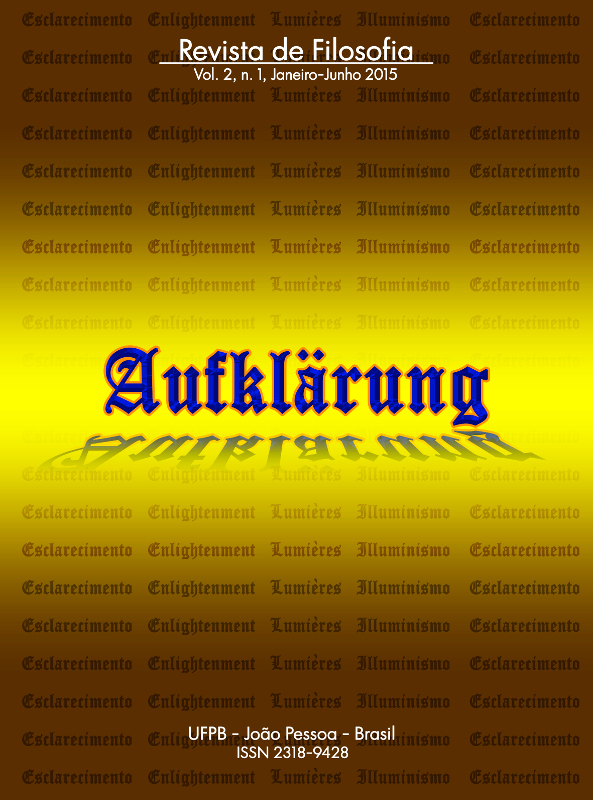Lei natural e lei civil em Locke
DOI:
https://doi.org/10.18012/arf.2016.21184Palavras-chave:
John Locke, lei natural, lei civil, liberdade, republicanismoResumo
Resumo: O artigo aborda a relação entre lei natural e lei civil na filosofia de John Locke. Embora leituras consagradas tenham afirmado que a relação entre ambas é dedutiva, este artigo tentará apresentar uma interpretação diferente, qual seja, a de que a relação entre lei civil e lei natural é de determinação. Longe de ser mera dedução de uma lei natural imutável, a lei civil possui papel determinante com relação à lei natural. Como mostraremos, esta interpretação realça algo que Locke tinha em alta estima: o caráter deliberativo da lei natural. A deliberação dos cidadãos na legislatura cria, em certa medida, a lei natural. Os cidadãos são livres para determinar a lei, e a participação em tal determinação é crucial para a manutenção de sua liberdade política. Nesse sentido, como veremos, a liberdade política lockiana é tributária do republicanismo.Downloads
Referências
BARROS, Alberto. “A matriz inglesa”. In: BIGNOTTO, N. Matrizes do republicanismo. Belo Horizonte: Editora UFMG, 2013.
BENTHAM, Jeremy. “Anarchical fallacies”. In: The Works of Jeremy Bentham: Published under the Superintendence of His Executor, John Bowring. Volume 2. Edimburgo: William Tait, 1843.
BOBBIO, Norberto. Locke e o direito natural. Trad. de S. Bath, 2ª ed. Brasília: Editora Universidade de Brasília, 1998.
BUCKLE, Stephen. Natural law and the theory of property. Oxford: Oxford University Press, 1991.
CÍCERO, Marco Túlio. De legibus e De re publica. Trad. de C. Keyes. Col. Loeb Classical Library. Massachusetts: Harvard University Press, 2006.
HARRINGTON, James. The commonwealth of Oceana and A system of politics. (1656) Editado por J. G. A. Pocock. Cambridge: Cambridge University Press, 1992.
LASLETT, Peter. “Introduction”. In: LOCKE, J. Two treatises of government. Cambridge: Cambridge University Press, 1988.
LIMONGI, Maria Isabel. “Direito, história e política em Locke”. In: ROCHA, E. LEVY, L. Estudos de filosofia moderna. Porto Alegre: Linus, 2011.
LOCKE, John. An essay concerning human understanding (1689). Col. Great Books of the Western World, vol. 35. Chicago e Londres: Encyclopædia Britannica, 1952.
_____. Essays on the law of nature and associated writings. Ed. de W. Von Leyden. Oxford: Clarendon Press, 2002.
_____. Locke: political essays. Org. de M. Goldie. Cambridge: Cambridge University Press, 1997.
_____. “Second treatise”. In: Two treatises of government (1690). Ed. de P. Laslett. Cambridge: Cambridge University Press, 1988.
_____.“Segundo tratado”. In: Dois tratados sobre o governo. Trad. de J. Fischer. São Paulo: Martins Fontes, 2005.
OXFORD ENGLISH DICTIONARY. Advanced Learner’s, 7th edition, 2005.
PETTIT, Philip. Republicanism. Col. Oxford Political Theory. Nova Iorque: Oxford University Press, 2010.
PITKIN, Hanna. “Obligation and Consent”. In: LASLETT, P. RUNCIMAN, W. SKINNER, Q. Philosophy, politics and society, 4th series. Oxford: Blackwell, 1972.
RAWLS, John. “Lectures on Locke”. In: Lectures on the history of political philosophy. Cambridge, MA e Londres: Harvard University Press, 2007.
RUSSELL, Bertrand. “Locke’s political philosophy”. In: A History of Western Philosophy. Nova Iorque: Simon & Schuster, 1972.
SALÚSTIO. Bellum Catilinae. Trad. de J. Rolfe. Col. Loeb Classical Library. Massachusetts: Harvard University Press, 1931.
SELIGER, Martin. “Locke’s natural law and the foundation of politics”. Journal of the history of ideas. Vol 24, no. 3, julho – setembro 1963.
SHAKESPEARE, William. “Richard III”. In: The plays and sonnets of William Shakespeare. Col. Great Books of the Western World, vol. 26. Chicago e Londres: Encyclopædia Britannica, 1952.
SKINNER, Quentin. “A third concept of liberty”. In: Proceedings of the British Academy 117. Londres: British Academy, 2002.
STRAUSS, Leo. Natural right and history. Chicago e Londres: The University of Chicago Press, 1953.
VILLEY, Michel. Le droit et les droits de l’homme. Paris: PUF, 2008.
WALDRON, Jeremy. “Locke’s legislature (and Rawls’s)”. In: The dignity of legislation. Cambridge; Cambridge University Press, 1999.
WOOD, Neal. Cicero’s social and political thought. Califórnia: University of California Press, 1988.
Arquivos adicionais
Publicado
Como Citar
Edição
Seção
Licença
Política de Direito Autoral para os itens publicados pela Revista:
1.Esta revista é regida por uma Licença da Creative Commons aplicada a revistas eletrônicas. Esta licença pode ser lida no link a seguir: Creative Commons Attribution 4.0 International (CC BY 4.0).
2.Consonante a essa politica, a revista declara que os autores são os detentores do copyright de seus artigos sem restrição, e podem depositar o pós-print de seus artigos em qualquer repositório ou site.
Política de Direito de Uso dos Metadados para informações contidas nos itens do repositório
1. Qualquer pessoa e/ou empresa pode acessar os metadados dos itens publicados gratuitamente e a qulquer tempo.
2.Os metadados podem ser usados sem licença prévia em qualquer meio, mesmo comercialmente, desde que seja oferecido um link para o OAI Identifier ou para o artigo que ele desceve, sob os termos da licença CC BY aplicada à revista.
Os autores que têm seus trabalhos publicados concordam que com todas as declarações e normas da Revista e assumem inteira responsabilidade pelas informações prestadas e ideias veiculadas em seus artigos, em conformidade com a Política de Boas Práticas da Revista.







































